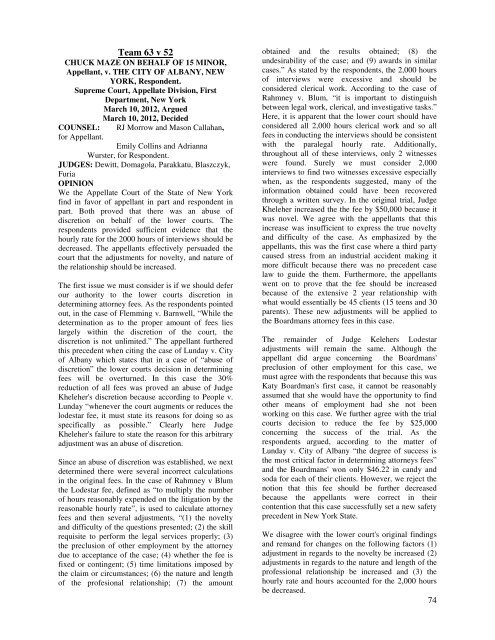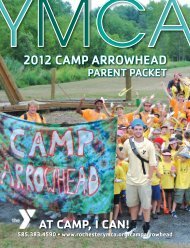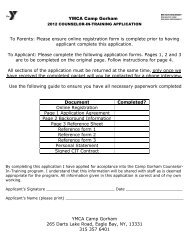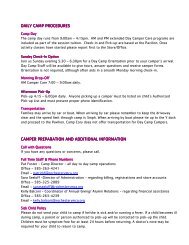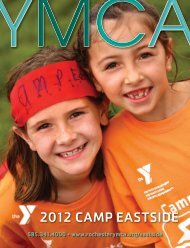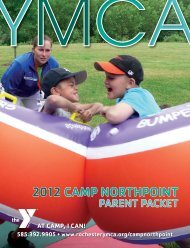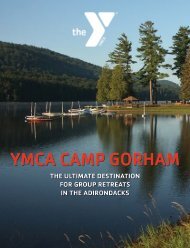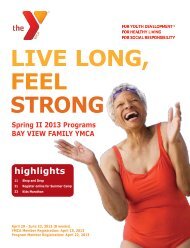2012 Conference Executive Record Report.pdf - YMCA of Greater ...
2012 Conference Executive Record Report.pdf - YMCA of Greater ...
2012 Conference Executive Record Report.pdf - YMCA of Greater ...
You also want an ePaper? Increase the reach of your titles
YUMPU automatically turns print PDFs into web optimized ePapers that Google loves.
Team 63 v 52<br />
CHUCK MAZE ON BEHALF OF 15 MINOR,<br />
Appellant, v. THE CITY OF ALBANY, NEW<br />
YORK, Respondent.<br />
Supreme Court, Appellate Division, First<br />
Department, New York<br />
March 10, <strong>2012</strong>, Argued<br />
March 10, <strong>2012</strong>, Decided<br />
COUNSEL: RJ Morrow and Mason Callahan,<br />
for Appellant.<br />
Emily Collins and Adrianna<br />
Wurster, for Respondent.<br />
JUDGES: Dewitt, Domagola, Parakkatu, Blaszczyk,<br />
Furia<br />
OPINION<br />
We the Appellate Court <strong>of</strong> the State <strong>of</strong> New York<br />
find in favor <strong>of</strong> appellant in part and respondent in<br />
part. Both proved that there was an abuse <strong>of</strong><br />
discretion on behalf <strong>of</strong> the lower courts. The<br />
respondents provided sufficient evidence that the<br />
hourly rate for the 2000 hours <strong>of</strong> interviews should be<br />
decreased. The appellants effectively persuaded the<br />
court that the adjustments for novelty, and nature <strong>of</strong><br />
the relationship should be increased.<br />
The first issue we must consider is if we should defer<br />
our authority to the lower courts discretion in<br />
determining attorney fees. As the respondents pointed<br />
out, in the case <strong>of</strong> Flemming v. Barnwell, “While the<br />
determination as to the proper amount <strong>of</strong> fees lies<br />
largely within the discretion <strong>of</strong> the court, the<br />
discretion is not unlimited.” The appellant furthered<br />
this precedent when citing the case <strong>of</strong> Lunday v. City<br />
<strong>of</strong> Albany which states that in a case <strong>of</strong> “abuse <strong>of</strong><br />
discretion” the lower courts decision in determining<br />
fees will be overturned. In this case the 30%<br />
reduction <strong>of</strong> all fees was proved an abuse <strong>of</strong> Judge<br />
Kheleher's discretion because according to People v.<br />
Lunday “whenever the court augments or reduces the<br />
lodestar fee, it must state its reasons for doing so as<br />
specifically as possible.” Clearly here Judge<br />
Kheleher's failure to state the reason for this arbitrary<br />
adjustment was an abuse <strong>of</strong> discretion.<br />
Since an abuse <strong>of</strong> discretion was established, we next<br />
determined there were several incorrect calculations<br />
in the original fees. In the case <strong>of</strong> Rahmney v Blum<br />
the Lodestar fee, defined as “to multiply the number<br />
<strong>of</strong> hours reasonably expended on the litigation by the<br />
reasonable hourly rate”, is used to calculate attorney<br />
fees and then several adjustments, “(1) the novelty<br />
and difficulty <strong>of</strong> the questions presented; (2) the skill<br />
requisite to perform the legal services properly; (3)<br />
the preclusion <strong>of</strong> other employment by the attorney<br />
due to acceptance <strong>of</strong> the case; (4) whether the fee is<br />
fixed or contingent; (5) time limitations imposed by<br />
the claim or circumstances; (6) the nature and length<br />
<strong>of</strong> the pr<strong>of</strong>esional relationship; (7) the amount<br />
obtained and the results obtained; (8) the<br />
undesirability <strong>of</strong> the case; and (9) awards in similar<br />
cases.” As stated by the respondents, the 2,000 hours<br />
<strong>of</strong> interviews were excessive and should be<br />
considered clerical work. According to the case <strong>of</strong><br />
Rahmney v. Blum, “it is important to distinguish<br />
between legal work, clerical, and investigative tasks.”<br />
Here, it is apparent that the lower court should have<br />
considered all 2,000 hours clerical work and so all<br />
fees in conducting the interviews should be consistent<br />
with the paralegal hourly rate. Additionally,<br />
throughout all <strong>of</strong> these interviews, only 2 witnesses<br />
were found. Surely we must consider 2,000<br />
interviews to find two witnesses excessive especially<br />
when, as the respondents suggested, many <strong>of</strong> the<br />
information obtained could have been recovered<br />
through a written survey. In the original trial, Judge<br />
Kheleher increased the the fee by $50,000 because it<br />
was novel. We agree with the appellants that this<br />
increase was insufficient to express the true novelty<br />
and difficulty <strong>of</strong> the case. As emphasized by the<br />
appellants, this was the first case where a third party<br />
caused stress from an industrial accident making it<br />
more difficult because there was no precedent case<br />
law to guide the them. Furthermore, the appellants<br />
went on to prove that the fee should be increased<br />
because <strong>of</strong> the extensive 2 year relationship with<br />
what would essentially be 45 clients (15 teens and 30<br />
parents). These new adjustments will be applied to<br />
the Boardmans attorney fees in this case.<br />
The remainder <strong>of</strong> Judge Kelehers Lodestar<br />
adjustments will remain the same. Although the<br />
appellant did argue concerning the Boardmans'<br />
preclusion <strong>of</strong> other employment for this case, we<br />
must agree with the respondents that because this was<br />
Katy Boardman's first case, it cannot be reasonably<br />
assumed that she would have the opportunity to find<br />
other means <strong>of</strong> employment had she not been<br />
working on this case. We further agree with the trial<br />
courts decision to reduce the fee by $25,000<br />
concerning the success <strong>of</strong> the trial. As the<br />
respondents argued, according to the matter <strong>of</strong><br />
Lunday v. City <strong>of</strong> Albany “the degree <strong>of</strong> success is<br />
the most critical factor in determining attorneys fees”<br />
and the Boardmans' won only $46.22 in candy and<br />
soda for each <strong>of</strong> their clients. However, we reject the<br />
notion that this fee should be further decreased<br />
because the appellants were correct in their<br />
contention that this case successfully set a new safety<br />
precedent in New York State.<br />
We disagree with the lower court's original findings<br />
and remand for changes on the following factors (1)<br />
adjustment in regards to the novelty be increased (2)<br />
adjustments in regards to the nature and length <strong>of</strong> the<br />
pr<strong>of</strong>essional relationship be increased and (3) the<br />
hourly rate and hours accounted for the 2,000 hours<br />
be decreased.<br />
74


